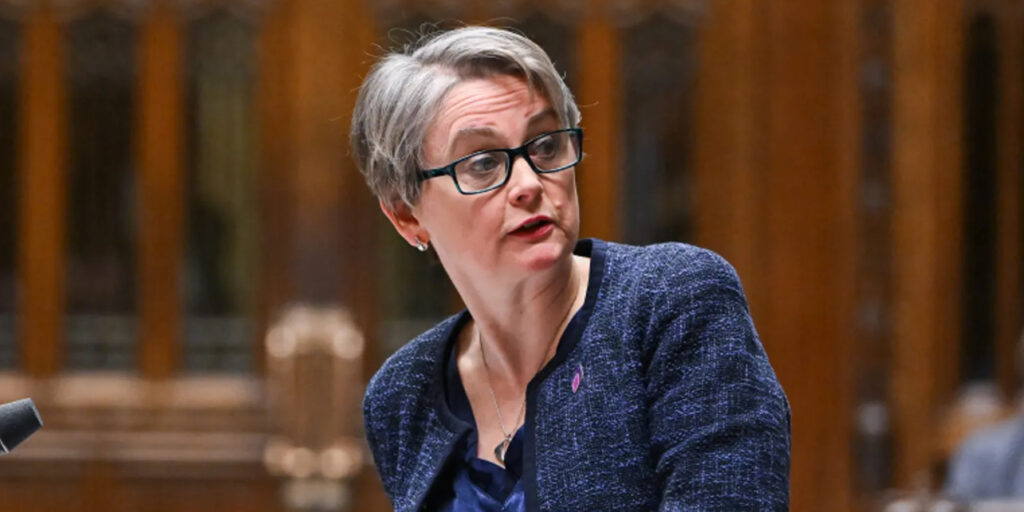The UK government has introduced long-overdue legislation to protect children forced into criminal activities by county lines gangs. The law, expected to save lives and dismantle a “brutal and lucrative criminal business,” will impose tougher penalties on those who exploit children for crime.
With the new measures, criminals using minors to transport drugs or commit offenses will face up to 10 years in prison. The law will make it a specific offense in England and Wales to use a child for criminal activities, while new child criminal exploitation prevention orders will restrict offenders’ ability to operate, Home Secretary Yvette Cooper announced.
Stronger Laws to Protect Vulnerable Children
“The exploitation of children and vulnerable people for criminal gain is sickening, and it is vital we do everything in our power to eradicate it from our streets,” Cooper stated.
The new orders will prevent suspected groomers from working with children, contacting certain individuals, or traveling to specific areas. Breaching these restrictions could result in up to five years in prison. Authorities will be able to impose these orders on convicted criminals or apply them preemptively when police identify a risk to children.
This law follows the tragic case of Kelyan Bokassa, a 14-year-old boy fatally stabbed on a bus in southeast London. His mother revealed that he had been groomed by gangs since the age of six.
Cuckooing Also Criminalized
Alongside tackling child exploitation, the new crime and policing bill will criminalize “cuckooing,” where criminals take over the homes of vulnerable people to use as drug dens. This offense will be punishable by up to five years in prison and will apply across the UK.
Jess Phillips, the Home Office safeguarding minister, highlighted the dangers of cuckooing, describing it as “a particularly insidious and harmful form of exploitation” that fuels violent drug dealing and antisocial behavior.
Support from Child Protection Advocates
Charities and child protection experts have welcomed the move, emphasizing the urgent need to hold perpetrators accountable rather than criminalizing exploited children.
Anne Longfield, former children’s commissioner and chair of the Centre for Young Lives, called the law “long overdue, very welcome, and a lifesaving measure.” She previously warned in 2019 that failures in tackling child sexual exploitation were being repeated with gang-related child exploitation.
Current Children’s Commissioner Rachel de Souza said vulnerable children have been “ignored and overlooked” for too long, and this legislation will bring “much-needed clarity.”
Mark Russell, CEO of The Children’s Society, stressed that the law shifts the focus onto criminals rather than victims. “Charges such as drug possession ignore the core truth—these are child abusers exploiting vulnerable young people. This is how we break cycles of harm: punish the exploiters, prioritize the victims, and put child safety first.”
A Home Office source confirmed that the law acknowledges children cannot consent to their own exploitation, but it does not override the age of criminal responsibility. The police and Crown Prosecution Service will continue to determine if charges should be brought against minors.
Survivor Shares His Story
Jay*, a survivor of child criminal exploitation, shared his harrowing experience of being groomed into county lines drug dealing while at college. Initially lured in with promises of easy money, he soon found himself trapped.
“They tell you, you won’t get into much trouble. If you get caught, you’ll just get a warning,” Jay said. “But then things started escalating.”
Earning £600 a week selling crack and heroin, Jay was under constant surveillance. “If I stopped for a break, my phone would ring: ‘We’re watching you. Why have you stopped? Go and run to your sale.’”
He faced threats, violence, and intense pressure from gang leaders. After his home life deteriorated, he moved into a hostel and was assigned a social worker.
“One day, she saw me on the street and asked me to get into her warm, dry car. I just felt like someone actually cared about my greater good,” he recalled.
Police later stepped in, offering protection in exchange for information. The Salvation Army relocated him to safety. “If they hadn’t done that, I think I would be dead by now, or at least in jail,” Jay said.
(*Name has been changed for privacy.)


